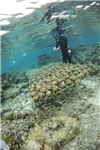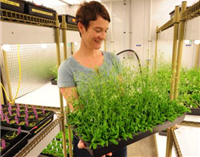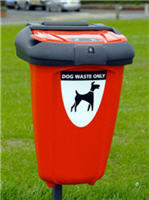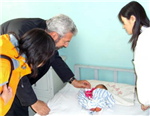Although the effects of change are well documented along the coast, where higher tides and ferocious storms have threatened native communities, a study by the U.S. Geological Survey (USGC) has found indigenous people in Alaska's interior also have felt the transformation to a warmer climate during the past several decades of their lifetimes.

Researchers at Missouri University of Science and Technology have developed a method to detect the presence of soil and groundwater contamination without turning a shovel or touching the water. Instead, they’re using trees.
The houses at 138 and 146 W. Foulke Ave. on the campus of The University of Findlay, Ohio, may look like “normal” student residences, but the students living in those houses chose to live there with a common goal to reduce energy consumption and to lower their carbon footprints.
The largest and most comprehensive study yet done on the effect of biofuel production from West Coast forests has concluded that an emphasis on bioenergy would increase carbon dioxide emissions from these forests at least 14 percent, if the efficiency of such operations is optimal.

A peer-reviewed study commissioned by NOAA shows the American people assign an estimated total economic value of $33.57 billion for the coral reefs of the main Hawaiian Islands.

At the bottom of plants' ability to sense touch, gravity or a nearby trellis are mechanosensitive channels, pores through the cells' plasma membrane that are opened and closed by the deformation of the membrane.
Plants need water to grow, but every hobby gardener knows that you shouldn’t carry this to excess either. During waterlogging or flooding, plants can’t take up enough oxygen that they urgently need for their cellular respiration and energy production.
Animals require oxygen, but oxygenated environments were rare on early Earth. New research from University of Southern Denmark shows that poisonous sulfide existed in the oceans 750 million years ago making large areas of the seafloor inhospitable to animal life. Such ocean conditions may have prohibited the emergence of animals on early Earth.

There’s an unsuspecting culprit contributing to U.S. water pollution: pet poop.

The global trend toward using fluorescent globes instead of incandescent ones as a strategy to beat climate change could be increasing eye disease, according to new research by scientists at The Australian National University.
The Antarctic ozone hole, which yawns wide every Southern Hemisphere spring, reached its annual peak on Sept. 12, stretching 10.05 million square miles, the ninth largest on record.
Removing a significant threat to public health and safety, the U.S. Environmental Protection Agency (EPA) and the municipality of Guaynabo, Puerto Rico, are proceeding with an emergency cleanup of improperly stored hazardous materials at a storage facility in Barrio Vietnam, Guaynabo.
Weeds have a greater impact on crop yields than any other pests. Over the past several decades, farmers have continually turned to synthetic herbicides because they are the most effective deterrent against weeds.
Reducing diesel emissions helps decrease asthma attacks and premature deaths.
Systems to harness the sun's energy typically generate either electricity or heat in the form of steam or hot water. But a new analysis by researchers at MIT shows that there could be significant advantages to systems that produce both electricity and heat simultaneously.
NOAA scientists have found that pressure from increasing coastal populations, ship and boat groundings, marine debris, poaching, and climate change are critically threatening the health of the Florida Keys ecosystem. Many historically abundant marine resources such as green sea turtles and coral habitat continue to be at risk with low rates of recovery.

Pesticides and pollutants are related to an alarming 450 percent increase in the risk of spina bifida and anencephaly in rural China, according to scientists at The University of Texas at Austin and Peking University.
The U.S. Environmental Protection Agency (EPA) recently announced that Dry Creek Rancheria in Sonoma County, Calif., has gained authority to administer its own water quality programs under the federal Clean Water Act.
If courts were able to award appropriate punitive damages that punish wrongdoers at a level tied to a company's financial worth, then businesses big and small would be at risk of being put out of business by punitive damages, thus deterring unconscionable offenses and bad behavior in the first place.
In a new camera trap survey in the world’s most biologically diverse landscape, researchers for the Wildlife Conservation Society have identified more individual jaguars than ever before.